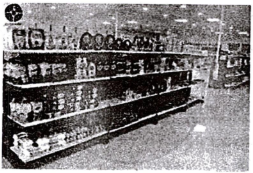Advertisements
Advertisements
प्रश्न
What is the difference between perfect and imperfect oligopoly?
उत्तर
| S. No. | Feature | Perfect Oligopoly | Imperfect Oligopoly |
| 1. | Product Differentiation | Products are homogeneous (identical). | Products are differentiated (varied in some way). |
| 2. | Competition | Firms compete primarily on price. | Firms compete on both price and non-price factors (e.g., branding, features). |
| 3. | Examples | Markets for basic commodities like steel, cement. | Markets for cars, electronics, and branded goods. |
संबंधित प्रश्न

The image above shows a departmental store of a market structure.
- Identify the form of market as observed from the above image.
- Discuss the features of this market form with respect to:
- Type of product
- Entry and exit of firms
- Selling cost
Selling costs are absent in perfect competition market.

“While shopping for fruits in the local market you see many seller selling fruits”. In this context answer the following:
- What is the type of market referred to?
- State and draw the type of demand curve faced by the market above.
- Differentiate between the market indicated above and monopoly on the basis of:
- No. of sellers
- Market price
- Entry and exit of firms in the market
A monopolist is price maker:
Which among the following is a feature of monopsony market?
Read the given statements carefully and select the correct option.
- The number of sellers under oligopoly are small.
- In monopolistically competitive markets, buyers and sellers have perfect knowledge about the market conditions.
Products sold by each firm in a perfectly competitive market are perfect substitutes of each other.
Match the following:
| Column I | Column II | ||
| A. | Monopoly | (i) | Availability of close substitutes |
| B. | Oligopoly | (ii) | Absence of close substitutes |
| C. | Perfect competition | (iii) | Few large sellers |
| D. | Monopolistic competition | (iv) | Homogeneous products |
Read the following statements carefully and choose the correct alternative:
Assertion (A): Under Perfect Competition, each firm faces a perfectly elastic demand curve.
Reason (R): Firm is a price maker under perfect competition.
State the market form of the following commodity.
Automobiles
Identify the market form for the item given below:
A single buyer
Give an example of price discrimination.
Which type of market structure is the following? Give reason.
Trucks
Why can a monopolist charge different prices in different markets?
What is the effect on price when a perfectly competitive firm tries to sell more?
Identify the market form from the following.
Firm is a price maker.
There is inverse relation between price and demand for the product of a firm under ______.
Why do producers incur high selling costs in an imperfect market?
Why are selling costs incurred?
